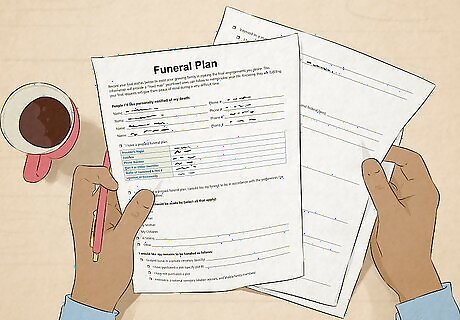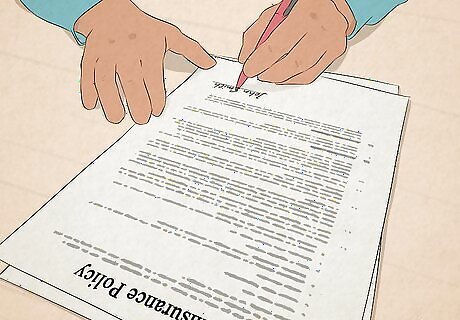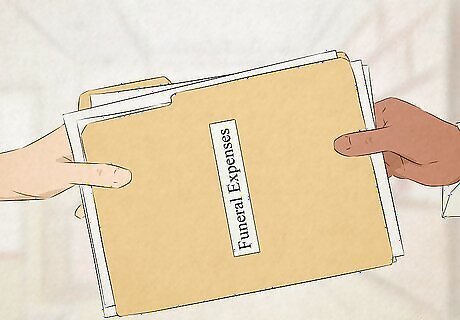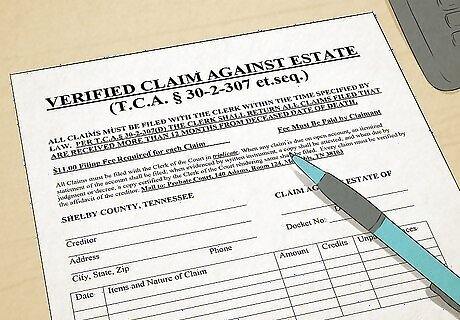
views
X
Research source
Using a Prepaid Plan

Find out who the executor of the estate is. Asking around among family members is typically the easiest way to find out who the executor is. Since the deceased hopefully talked to that person before naming them executor (it's quite a responsibility), that person probably already knows who they are. The executor (also called a "personal representative") is in charge of closing out the affairs of the deceased. The executor is also typically in charge of making funeral arrangements. If the deceased had a will, they probably listed the executor there. If the deceased did not have a will, the probate court will usually appoint an executor. In the meantime, funeral arrangements and other end-of-life issues are typically handled by the next-of-kin or another close relative who steps up and is willing to handle it.

Ask the executor if the deceased had a funeral plan. Many people make arrangements to cover all or part of their funeral expenses through a prepaid funeral plan. The executor will likely know if the deceased made these arrangements. If there's no executor, ask the surviving spouse or next of kin. There are 3 basic types of prepaid funeral plans: Prepaid funeral: The funeral was planned and paid for in advance by the deceased. There will be a contract that details how the funeral will take place, typically with the funeral director. Funeral bond: The person invested money to pay for their funeral. Usually, no specific plans have been made. The money is payable on death at its current value and you have that money to go towards funeral expenses. Funeral insurance: The deceased paid premiums each month. The policy is payable on death at a set amount to a named beneficiary. That money goes towards funeral expenses.

Get the paperwork for the plan to find out what's covered. If you find out the deceased had a funeral plan, look at the plan documents the deceased left behind. If they had a will, these plans will likely be in the same place. If not, look through their important papers. This might feel awkward or intrusive, but it's necessary to find the paperwork you need. The terms of the plan outline what's included and what you or other family members will be responsible for so you can budget accordingly. Depending on how long ago the deceased purchased the plan, there might also be some products originally included in the plan that are no longer available. The funeral director will likely have some suggestions for suitable replacements. If the plan was set up directly with a specific funeral home, plan the funeral services there. Prepaid arrangements set up by specific funeral homes aren't transferable.
Covering Funeral Expenses

Enter an agreement with a funeral director. Talk to the funeral director about your plans for the funeral and go over the various items you'll need. This can be tough, and you may not really know what you need, but a good funeral director understands what you're going through. They'll explain the options that are available and provide you an estimate of the costs of the funeral. Go over these expenses with the executor and get their approval to avoid hassles later. Since this is an emotional time, it's also a good idea to have an attorney go over the contract before you sign. If the deceased hasn't already picked out a specific funeral home, talk to funeral directors at 2 or 3 places so you can compare costs and choose the best deal. Pay attention to the atmosphere of the funeral home itself and the area where the ceremony will take place. Have the funeral director walk you through what will happen on the day of the funeral. This will help you choose a place where family and friends of the deceased will be comfortable.

Find out how much you need to pay upfront. Funeral directors don't necessarily demand that you pay the full costs of the funeral upfront. They recognize that typically the money will come out of the estate, which can take some time to access. However, you'll likely still have to pay upfront for expenses the funeral director has to pay to other companies and services, such as those for flowers, obituary notices, officiating clergy, and music. Ask for a schedule of dates when specific amounts are due. If you have to wait for funds to come available, such as through an insurance policy, make sure the funeral director understands this.

Use the death certificate to access the bank account of the deceased if possible. Although different banks have different rules, many will allow you to access the bank account of a deceased person if you are the executor of that person's estate or their next of kin. You may also be able to use this money to cover funeral expenses. Call a local branch of the bank the deceased used and ask what you need (in addition to the death certificate) to access the bank account of the deceased. Typically, the funeral director applies for the death certificate. When it's ready, they'll make certified copies available to you. If you had a joint account with the deceased, you already have access to the account and can use it for funeral expenses if you want.

Sign over a life insurance policy to the funeral home if you're the beneficiary. If you're the executor of the estate, you might be able to use the proceeds of a life insurance policy to cover funeral expenses. This only works for policies that are paid into the estate — not policies that are payable to a named beneficiary. You can also use the life insurance policy if you are named as the beneficiary. However, since it can take 6-8 weeks to get the life insurance payout, you might still need to pay the funeral home, then use the life insurance proceeds for reimbursement. If you know that you're the beneficiary of a life insurance policy and have proceeds coming, talk to the funeral director. They might be willing to wait until you get the insurance money.
Getting Reimbursed by the Estate

Talk to the executor before incurring funeral expenses. With many estates, it can take months before the executor has a good idea of how much money is in the estate and what will be left after debts are paid and any bequests are made. However, if they have a basic idea, they can help you make planning decisions that are within the means of the estate to cover. Ask the executor of the estate whether the person who passed left any instructions for the type of funeral service they wanted. If there aren't any, talk to the person's other loved ones and try to plan a service that they'll find meaningful. If the funeral expenses are too high given the size of the estate, beneficiaries might raise an issue that the spending was unreasonable. For example, if the estate is valued at $40,000 and you spend $25,000 on funeral expenses, that amount would typically be considered unreasonable. In that situation, you would be unlikely to get all of the expenses reimbursed by the estate.

Submit receipts for funeral expenses to the executor. Typically, the estate will reimburse you for funeral expenses as long as you can prove that you paid them. Usually, all you have to do is pass on the receipts to the executor and they'll take care of it. Unfortunately, any debts of the deceased, including a mortgage or credit cards, have to be squared away before funeral expenses can be reimbursed. You can ask the executor to itemize those debts for you and estimate how long it will take for you to get a reimbursement. Assume that it will take 9-12 months to get your money back.

File a claim against the estate if it seems like you're not going to get paid. Put your claim in writing and state specifically what the expenses were. Most courts have forms for this purpose. Attach copies of your receipts to your claim. Mail it to the executor or to the clerk of court (if the estate has already been admitted to probate) using certified or registered mail so you have proof of receipt. This can put you in an uncomfortable situation, especially if you're close to the executor. Be upfront about not wanting to do it and explain that it's not personal. Some probate courts have forms you can use to file a claim. Contact the clerk of the probate court where the deceased lived and ask if there's a form you can use.




















Comments
0 comment